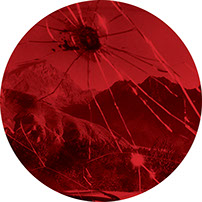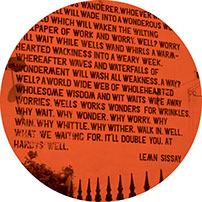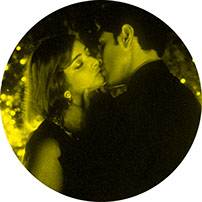N O T E S F R O M T H E S O U T H
 Fucking with Skin
Fucking with Skin
Johan Thom is one of South Africa’s foremost performance artist. He uses his own body and physical objects as the site of exploration and expression. His work is often created in various public urban contexts as well as museums and galleries. Thom’s works draw from his daily experience of life in South Africa, as well as from distinctly different cultural traditions and philosophies. Peter Machen spoke to him about his work and the world in which that work takes place
Peter Machen: Although I have a very good idea of your work from images and information on the internet and other documentation, I have not seen you perform in the flesh. Do you think that the documentation of performance art can in any effective way reconstruct the experience of actually being there, watching the performance? If not, is this one of the limits of performance art – that it is always bound by the ephemerality of the now?
Johan Thom: Documentation of a performance will always remain just that: documentation. We should never confuse the residue (of the work) with the event - even if it is accompanied by an explanatory text. However, the residue is not meaningless, it is just something else. If one is critical, you can evaluate how this ‘something else’ is situated in the realm of art/culture and begin to ask some difficult questions about the artists’ intentions in making the work available in a particular form eg. “I must have something to sell”. (Translation: you get what you pay for). Moreover, a lot of so-called ‘performance art’ is actually quite weak, a fact easily concealed by gorgeous photographs and some insightful text where the author gets to showcase their mastery of contemporary ‘art-speak’.
The ephemeral nature of performance is not a limit as much as a possibility. These days most art is seriously limited by its incapacity to do anything other than hang on the wall, sell for a ridiculous price or get stored in some museum basement somewhere. That is not to say that painting or sculpture cannot do more than that - it has just become increasingly easy to forget the fact that good object-based art far exceed the modest expectations of our commodity driven, consumer society. For me performance art is alive, its real and even though it may be bought or commissioned, you can never really purchase the experience of the work during the time of its creation. Problems of copyright and ownership remain inherent in all forms of art but the overt ephemeral nature of performance seem to pose them acutely: would the potential buyer purchase the whole event or just the sequence of actions that together comprise the work? What about the audience: do they not lay claims of ownership that supersede those of the collector who purchases the work after the fact? It seems to me that the only way a collector could ever really own a performance is by commissioning it for their private consumption, but that is a little bit like owning a painting that you can never really show to anyone else.
That said, I mostly do performance art because it doesn’t bore me. I like the experience of combining image, action and thought in a single focused whole – a once-off moment where chance, purpose and play may come together. The experience of it is my gift to the audience.

PM: You talk about “the void”, a space that is unaccounted for by the limits of human logic and reason. You continue to say that this void is woven into the fabric of everyday life, constantly threatening to unravel. You also mention that the void is part of all cultures, all societies. I take this “void” to mean the essential meaningless of existence, the abyss of negation. Or to rephrase – all is illusion. Is this a resonant meaning? And if so, is it not true that different cultures relate to the void differently? Buddhists, for example, or the aboriginal peoples of the world.
JT: I think the void is a positive (negative) space, a gaping hole that yawns whilst we all do our utmost to fill it to the brim with something like ‘meaning’. But as Nietszche says, it is essential that we create, for it makes our existence bearable. Moreover, what exactly we create has the ability to impoverish or to enrich the experience of life. We must be mindful of this while we grapple with the (w)hole and even then, we must be brutally honest about the shortcomings of our efforts. Of course, our efforts will always fall short but their failure may either spread cancer or become the malignant reminders of the simple fact that we are alive. The former leads to despair and decay whereas the latter revitalizes our efforts.
PM: In Bind/Ontbind, the physical binding of yourself and objects refers to the constant cycles of growth and decay, the concurrent events of existence and non-existence. As you imply, death is life, decay is growth - they are not separate processes. Do you think THAT if human beings could collectively reconcile these binaries into a unity, that life on earth would be different?
JT: For one thing, humanity would be less callous. All the systems of meaning we create in some way posit the dream of overcoming the inevitable decay of our being. These systems insulate us against the reality of our fragility and, in doing so, authorise modes of being in which others are made to pay the price of sustaining our delusions of grandeur. Imagine, if you will, a world in which science finally makes immortality a fact. At first we celebrate but our joy soon fades when we realise that the mere existence of other beings now either threatenS or ensures our personal survival. Like Saturn devouring his son, we are forced to kill our offspring. Perhaps some become slaves, the lower classes, and others become gods. We must think about this when we walk into museums and libraries, when we vote or study. Though we are not yet immortal, the political, economic and socio-cultural systems of thought that govern us, all present themselves as such. That is why we lead boring lives in which we tacitly have to accept our ‘station’: If I pay fealty to the system perhaps I can become immortal too?
We must demand a different kind of life, one filled with real excitement and genuine experiences. This demand is easy to make and worthwhile fighting for: nothing guarantees your place in this world and if you are alive, you will die. Whether anyone remembers you or not, is beside the point.

PM: Although your work is metaphorical, it is also extremely visceral. To what extent do you think people make the jump between the physical experience of watching you perform, and applying some kind of meaning to the work? Or is this application unnecessary? Can meaning exist with strength at an unconscious level, even if it is not navigated consciously?
JT: Meaning cannot exist at an unconscious level. It is the regressive trickery of causal, rational thinking that locates it there - that justifies it and calls it into being as categorical fact. At an unconscious level there are much greater powers at work than those presupposed by the detached modus operandi of empirical thinking. Thus it is the supreme ambition to intervene at the unconscious level for that is where the very nature of being expresses itself as a force and not as its outcome, as something like ‘meaning’.
In answer to your question, I am not at all interested in the question of meaning other than saying that all interpretation is free. Moreover, if people quickly jump to conclusions when they see a performance, from the action to the meaning of it so to speak, then that work has failed as far as I am concerned. If this thing bothers them, re-appears later in their thoughts and haunts them, then the work has succeeded because it has posed a symbolic question that cuts through the veil of certainty, an experience for which there are no easy, ‘meaningful’ answers.
PM: You write about transgression and exposure, where transgression exposes the limits of our knowledge. I was thinking last night about commentary on the internet, how most people (but not everybody) presume their own opinion to be the most authoritative or correct. But of course we all know virtually nothing about an infinitely complex (or perhaps infinitely simple) everything. As I understand it, and have on occasion experienced it, when we let go of the desire for knowledge and meaning, we find ourselves in a far richer space, but one that is without signifiers or any kind of linguistic structure. This is, I think, essentially a spiritual space or condition. Does this make sense? Is your work engaging with the spiritual?
JT: All things engage with the spiritual, it is simply a question of to what degree they acknowledge it or not. Moreover, the space that you describe seems to me closer to the pure experience of being. It’s a physiological condition, one where form and structure is displaced by the value of function, not in the utilitarian sense of the term, but rather in a philosophical sense where a being may come to experience itself as enough-in-itself. The moment one views this experience as a ‘religious’ state for example, you have already positioned the meaning of this form of being as outside of itself. Thus it seems to me that the only everyday English term we have to describe this condition is “spiritual”, a condemnation of our language and thought so severe that we have to reconsider all of it. Perhaps it is good that the term “spiritual” is so vague but when one considers that the Eskimos have something like a 100 different terms for snow it seems more than just a little problematic to me.
I do wish to pose this problem in my work but do not wish to do so within the rigid strictures of existing thought – that is why I generally create fairly chaotic scenarios incorporating elements from everyday life, politics, economics, spirituality and language.

PM: Which leads me to the final question. Much of your work seems, to me, to be quite shamanistic, both conceptually and physically. Do you agree? Do you see yourself in such a light at all?
JT: I am not a shaman but I think the concept of ‘building bridges’ (between different worlds and states of being) inherent in it, of real value. To return to something I said earlier, I think this approach to art, and indeed all aesthetic phenomena, may enrich life. Then it's not about making great art but rather about making things that add vitality to life. It’s not the kind of thing where you can ever pat yourself on the back and say “Good day's work”. If you do it right, no one else will ever say that either. We do not congratulate horses for being horses, do we?

More
Art
© 2017 Peter Machen. All rights reserved About Contact Peter Machen Web design: The Communication Factory


